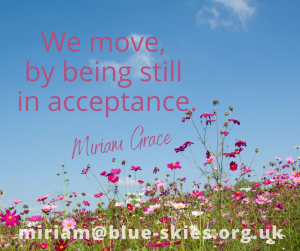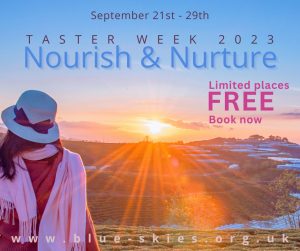CLICK ON THE PICTURE FOR MY VIDEO:
“The Paradoxical Theory of Change”
..change occurs when one becomes what he is, not when he tries to become what he is not. Change does not take place through a coercive attempt by the individual or by another person to change him, but it does take place if one takes the time and effort to be what he is — to be fully invested in his current positions.
Arnold Beisser, M.D.
(click here for the original article)
I’ve been working with clients for nearly 34 years now, but there is so much I’m still learning and developing decades on. The Paradoxical Theory of Change, found in Beisser’s article, is one of my favourite Gestalt concepts and I’m posting about this again, as I’m using this concept in my Nourish & Nurture Taster Week, beginning on Thursday. (There is still time to join this free experience of my group here.)
The values of empathy and being non-judgemental are not simply ways of creating a nice, fluffy therapeutic environment but are radical and political and turn the world on its head. They assume what the paradoxical theory of change assumes, that we do not need to change others or ourselves. That we can change our lives by doing nothing, by stopping trying.
The Gestalt therapist rejects the role of “changer,” for his strategy is to encourage, even insist, that the patient be where and what he is. He believes change does not take place by “trying,” coercion, or persuasion, or by insight, interpretation, or any other such means. Rather, change can occur when the patient abandons, at least for the moment, what he would like to become and attempts to be what he is. The premise is that one must stand in one place in order to have firm footing to move and that it is difficult or impossible to move without that footing.
(Ibid)
Trying doesn’t work half as well as being.
Stopping trying is radical
Nourish and Nurture emerged from my own experiences of knowing my ambitions were not aligned with my energy and capability, most especially in winter. Further explorations and connections with nature and women’s life cycles such as menopause, helped me develop my work into this beautiful course, to support women to let themselves go with the flow. Many of us are less productive in the winter. We don’t berate the trees for losing their leaves, for being still and quiet, and we can allow ourselves the same appreciation and respect.
Compassion, non-judgement and empathy for ourselves and others, support this radical step.
When we try to be who we are not, we stay more and more stuck in a cycle of attempting the impossible and of failure to become someone else’s version of us. When we are compassionate and accept ‘what is’, who we are, then profound change happens, ie. less effort can be more productive.
We don’t berate the trees for losing their leaves
Our brain function improves when our physiology is relaxed. Resting isn’t resting if we are feeling guilty or anxious or wrong. Nourish and Nurture is the antidote to years of believing we should be doing more.
We may think, it’s all very well for Beisser to claim this but accepting our being is not so easy for us. We may well think this until we learn that the author was in an iron lung. A brilliant doctor who became ill, disabled and confined. His theory of being where we are cannot have been easily adopted.
Less effort can be more productive
Why do we feel we have to build a court case to simply be? Sometimes we seem to need to justify our expression of feelings, (“It’s because I’m tired / hormonal / I had a bad week”). I explain to my clients that when we sneeze, blink or hiccough we don’t go into long justifications, we know we are blinking because we need to blink, we don’t feel a need to explain. So is a weep or a shout or and excited jumping up and down really so unacceptable we have to apply for permission, quoting extenuating circumstances, before we can experience and express it?
Last week I blogged about my experiments with doing things half assed, and the book that is helping me develop my alignment of ambition and energy capacity. I’ve been teaching this for decades – my students used to say that their abiding memory of their counselling training with me was, ‘self-care, self-care, self-care”. It is often said we teach best what we most need to learn!
What would it be like for YOU to just BE, to stop trying and and justifying and explaining? If you’d like some support to make this daily practice, then please try my Nourish and Nurture group – you don’t have to speak to anyone or do anything, you just have to receive my daily prompts for pondering. Taster Week costs nothing and there’s no catch. For more details click here: TASTER WEEK INFORMATION

